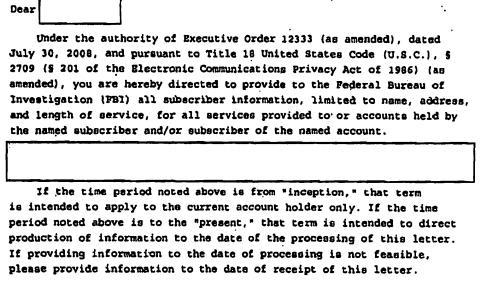Is Twitter EFF’s Second NSL Client?
In the past, I’ve tracked the efforts of a telecom — which WSJ convincingly argued was Credo — to challenge a 2011 National Security Letter. It has the support of EFF on that challenge. I also noted language in Credo’s Transparency Report (which was issued after DOJ permitted providers to give broad bands for NSLs, but before DOJ permitted them to give broad bands for other national security demands) saying it was prohibited from giving more information about NSLs and Section 215 orders.
It is important to note that it may not be possible for CREDO or any telecom carrier to release to the public a full transparency report, as the USA PATRIOT Act and other statutes give law enforcement the ability to prevent companies from disclosing whether or not they have received certain orders, such as National Security Letters (NSLs) and Section 215 orders seeking customer information. [my emphasis]
Today, EFF noted that it has filed what should be its response to the government’s appeal in that case.
Only, it makes it it representing not just the known telecom client, but also an Internet client.
The Electronic Frontier Foundation (EFF) filed two briefs on Friday challenging secret government demands for information known as National Security Letters (NSLs) with the Ninth Circuit Court of Appeals. The briefs—one filed on behalf of a telecom company and another for an Internet company—remain under seal because the government continues to insist that even identifying the companies involved might endanger national security.
While the facts surrounding the specific companies and the NSLs they are challenging cannot be disclosed, their legal positions are already public: the NSL statute is a violation of the First Amendment as well as the constitutional separation of powers.
Now, one obvious potential Internet client would be Google. It is known to have fought NSLs in Judge Susan Illston’s court and lost.
But I wonder whether it isn’t Twitter.
I say that, first of all, because of the cryptic language in Twitter’s own Updated Transparency Report, which was released after the DOJ settlement which should have permitted it to report NSLs. But instead of doing so, it pointed out that it can’t report its national security orders, if any, with enough particularity. It called out NSLs specifically. And it used a language of prohibition.
Last week, the U.S. Department of Justice and various communications providers reached an agreement allowing disclosure of national security requests in very large ranges. While this agreement is a step in the right direction, these ranges do not provide meaningful or sufficient transparency for the public, especially for entities that do not receive a significant number of – or any – national security requests.
As previously noted, we think it is essential for companies to be able to disclose numbers of national security requests of all kinds – including national security letters and different types of FISA court orders – separately from reporting on all other requests. For the disclosure of national security requests to be meaningful to our users, it must be within a range that provides sufficient precision to be meaningful. Allowing Twitter, or any other similarly situated company, to only disclose national security requests within an overly broad range seriously undermines the objective of transparency. In addition, we also want the freedom to disclose that we do not receive certain types of requests, if, in fact, we have not received any.
Unfortunately, we are currently prohibited from providing this level of transparency. We think the government’s restriction on our speech not only unfairly impacts our users’ privacy, but also violates our First Amendment right to free expression and open discussion of government affairs. We believe there are far less restrictive ways to permit discussion in this area while also respecting national security concerns. Therefore, we have pressed the U.S. Department of Justice to allow greater transparency, and proposed future disclosures concerning national security requests that would be more meaningful to Twitter’s users. We are also considering legal options we may have to seek to defend our First Amendment rights. [my emphasis]
It was a defiant Transparency Report, and it discussed prohibitions in a way that no one else — except Credo — had done.
Moreover, it would make sense that EFF would be permitted to represent Twitter in such a matter, because it already had a role in Twitter’s challenge of the Administrative subpoena for various WikiLeaks’ associates Twitter data.
Finally, EFF notes that this Internet client is fighting just 2 NSLs; Google is fighting 19.
The very same day that the district court issued that order striking down the statute, a second EFF client filed a similar petition asking the same court to declare the NSL statute to be unconstitutional and to set aside the two NSLs that it received.
Notwithstanding the fact that it had already struck down the NSL statute on constitutional grounds in EFF’s first NSL case, but indicating that it would be up to the Ninth Circuit to evaluate whether that evaluation was correct, the district court denied EFF’s client’s petitionand ordered them to comply with the remaing NSL in the interim.
If Twitter is the client, it would present real First Amendment issues. It would suggest that, after Twitter took the rare step of not just challenging but giving notice in an Administrative subpoena, DOJ decided to use NSLs, which are basically Administrative subpoenas with additional gags, in response.
Update: in potentially related news, Verizon just updated its Transparency Report, claiming it can’t provide details on some bulk orders.
We note that while we now are able to provide more information about national security orders that directly relate to our customers, reporting on other matters, such as any orders we may have received related to the bulk collection of non-content information, remains prohibited.


